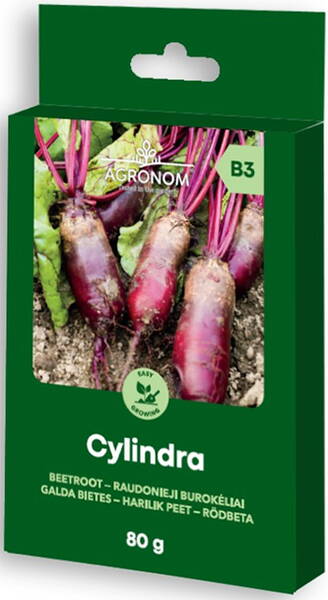Easy harvest!
Mid-season variety: the period from germination to harvesting of root crops is 110-130 days. The variety is high-yielding, transportable, and stores well. Saves crop area.
The rosette of leaves is semi-erect, the leaves are light green. The root crops are cylindrical, dark red, 10-16 cm long, 5-9 cm in diameter, weighing 180-350 g with a small pointed tip and a smooth surface, easily pulled out of the soil.
The flesh is dark red, without rings, sweet, with high taste qualities. The skin is thin. The root crops are immersed in the soil by 1/3-1/4 of their length.
It is distinguished by good keeping quality and resistance to diseases. The yield is 7-9 kg/m2.
Used for storage and preservation.
Growing conditions.
Before sowing, soak the seeds in water for a day.
Sow in spring when the soil warms up to +8+10°C. Place on loose, deeply cultivated soils. Sowing depth (depending on soil type) - 2-4 cm, distance between rows 30-40 cm, after thinning, the distance between plants is 10-15 cm (thinning in the phase of 2-3 true leaves).
Harvest: VIII-IX.
1.0 g = 40-60 seeds.
* The easiest way to disinfect seeds is to warm them in hot water (+48+50°C) for 20-30 minutes. After the procedure, they must be immediately cooled by keeping them in cold water for 2-3 minutes and dried.
Before planting, seeds with a dense shell (beets, spinach, onions) or containing essential oils (parsley, carrots) are kept in water for 24 hours; seeds of cucumbers, zucchini, tomatoes, cabbage, lettuce - no more than 12 hours; seeds of peas and beans are immersed in water first for 2 hours, then taken out and after 3 hours again placed in water for 2 hours.
Soak the seeds in a low wide vessel. Immerse them in water at room temperature shallowly and preferably in a gauze bag. It is important that the amount of water corresponds to the volume of the seeds being soaked.
So, for cucumbers and cabbage there should be 2 times more water than seeds; for carrots, parsley, parsnips, lettuce, peas, beans - an equal amount; for tomatoes, onions - 20-30% less than seeds.
Periodically, the bags with seeds are taken out of the water to enrich them with oxygen. The water is changed every 4-5 hours.
To soak the seeds, not only water is used, but also weak solutions of microelements: boron and molybdenum. Sprouted seeds are sown in warm weather and in moist soil.
If the weather is bad, the seeds are put in the refrigerator or sprouted until individual white roots appear on damp filter paper.















